Time for a new heresy. I think it’s a good thing to air our heresies, and I also think that we don’t do it enough. I suspect that the reason why we don’t do it enough is for fear of what the dear brethren might think of us. Such fear is a bad thing, since it denies us the opportunity to deal with our questions in daylight. Unfortunately, fear frequently turns out to be justified, since judgment and un-grace are heaped upon those perceived to be “not quite as saved / sound / sorted” as the self-appointed judges: “If grace is so amazing, why don’t Christians show more of it?” (Yancy, 1997).
At the moment in the Christian community, in the UK (don’t know if it’s happening in other places?) there is a brouhaha occurring on the subject of “substitutionary atonement”. As would be expected, the community has responded with its usual level of maturity, and is thus polarized between the red corner and the blue corner, having opted for war over dialogue. “Horsey” novelist Dick Francis once said:
“Entrenched belief is never altered by the facts” (Francis:”Hot Money”).
Without wishing to wade onto the battlefield, to which I could add very little anyway, an over-simplistic understanding of substitutionary atonement might go something like this. God is judge, and he judges us according to his standard, which happens to be perfection. Not surprisingly we all fall short of the mark, since we are characterised by imperfection, otherwise known as sin, and all sin matters. So all are deserving of punishment. However, God is love as well as judge, and having found us worthy of punishment, he also provides the solution. In the person of his son, Jesus Christ, he came to earth as a man and willingly took our punishment upon himself (hence “substitutionary”) and bore our sin’s condemnation in his own body on the cross. Thus judgment and love are inseparable in the act of the crucifixion.
The Bible tells us that Jesus was both fully God and fully human. This is important for thinking about substitutionary atonement. If we think about the analogy of a judge for a minute. A judge finds a person guilty and orders them to pay a fine. If the judge, instead of fining the guilty party, imposed the fine upon a random person who happened to be sitting in the courtroom, then that would be blatantly unjust and could not be interpreted as loving in any sense. However, if the judge fined the guilty party, but then undertook to pay the fine him/herself, then that could be interpreted as an act of love. Hence Jesus being fully God could choose to pay the “fine” himself on behalf of humanity, even though he owed nothing.
Now up to this point, I might not be the greatest theologian, and my understanding may be limited and simplistic, but, for my own purposes at least, I’m doing OK so far. Here’s where it goes wrong and the question kicks in. What is going on with that cross? At this point the judge analogy blows apart. The judge imposes a fine, and decides to pay same him/herself. S/he rises, crosses the courtroom, and to the bewilderment of all, and the gratitude of the defendant, hands the corresponding sum to the prosecution. Bows, applause, Daily Mail has a field day, all live happily ever after.
However, this analogy can only work if the judge and the plaintiff are separate entities. If the two were one and the same, then no money would actually change hands since the same person would both impose the fine and write it off. If the judge felt like it, they might take the money out of their wallet, hold it up to the court, and put it back in again to show the extent of the price paid, and forgiveness received. But this would be a symbolic demonstration, and not a necessary facet of the forgiveness itself.
Yet here we have God in the person of Jesus, both plaintiff and judge, succumbing to torture and execution, apparently in order to appease himself. How on heaven or earth does that work?
I don’t actually need an answer, or not this week anyway, which is fortunate since I don’t imagine I’m going to find one. What I am asking for is a space to think about it, and for any contributions that anyone wants to add to the soup. I suspect that this “God became a man” thing is too important to be tied up in crazy theories or boxing rings, and that we need to find other ways of living with it, and ultimately with Him:
“I am one of those who think it good that the church has never formally defined ‘the atonement’, partly because I firmly believe that when Jesus himself wanted to explain to his disciples what his forthcoming death was all about, he didn’t give them a theory, he gave them a meal” (Wright, NT: “The Cross and the Caricatures”, 2007)
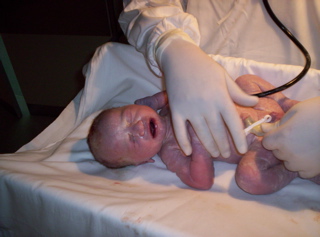 This is Jonathan, newly arrived in the world and registering his first list of complaints… being cleaned, being suctioned, being weighed, being measured, being injected, being dressed…
This is Jonathan, newly arrived in the world and registering his first list of complaints… being cleaned, being suctioned, being weighed, being measured, being injected, being dressed…
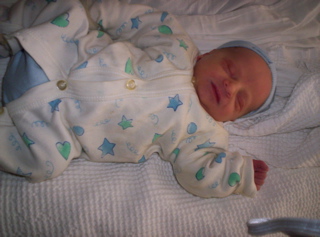 Here he is clothed and in his right mind, looking pink and cute in our room on the ward.
Here he is clothed and in his right mind, looking pink and cute in our room on the ward.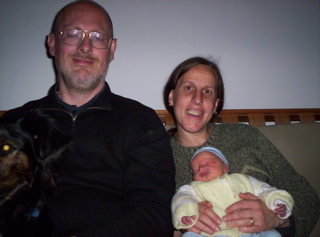 This is us released from hospital, arrived at home, and setting out on a whole new learning curve, encompassing the enormity of psalm 139 and being entrusted with the nurture of this little person whose every detail has been crafted and known by God since the beginning of time; to the “significant trivia”, like how we don’t yet have any sheets for the cot…
This is us released from hospital, arrived at home, and setting out on a whole new learning curve, encompassing the enormity of psalm 139 and being entrusted with the nurture of this little person whose every detail has been crafted and known by God since the beginning of time; to the “significant trivia”, like how we don’t yet have any sheets for the cot…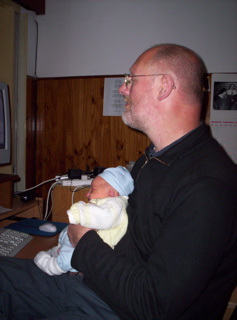 Training for the family business begins at an early age. Here he is having bonding time with Daddy, who by the way did a superb job yesterday gowned and scrubbed up in the delivery suite, and is fast becoming a dab hand with those nappies.
Training for the family business begins at an early age. Here he is having bonding time with Daddy, who by the way did a superb job yesterday gowned and scrubbed up in the delivery suite, and is fast becoming a dab hand with those nappies.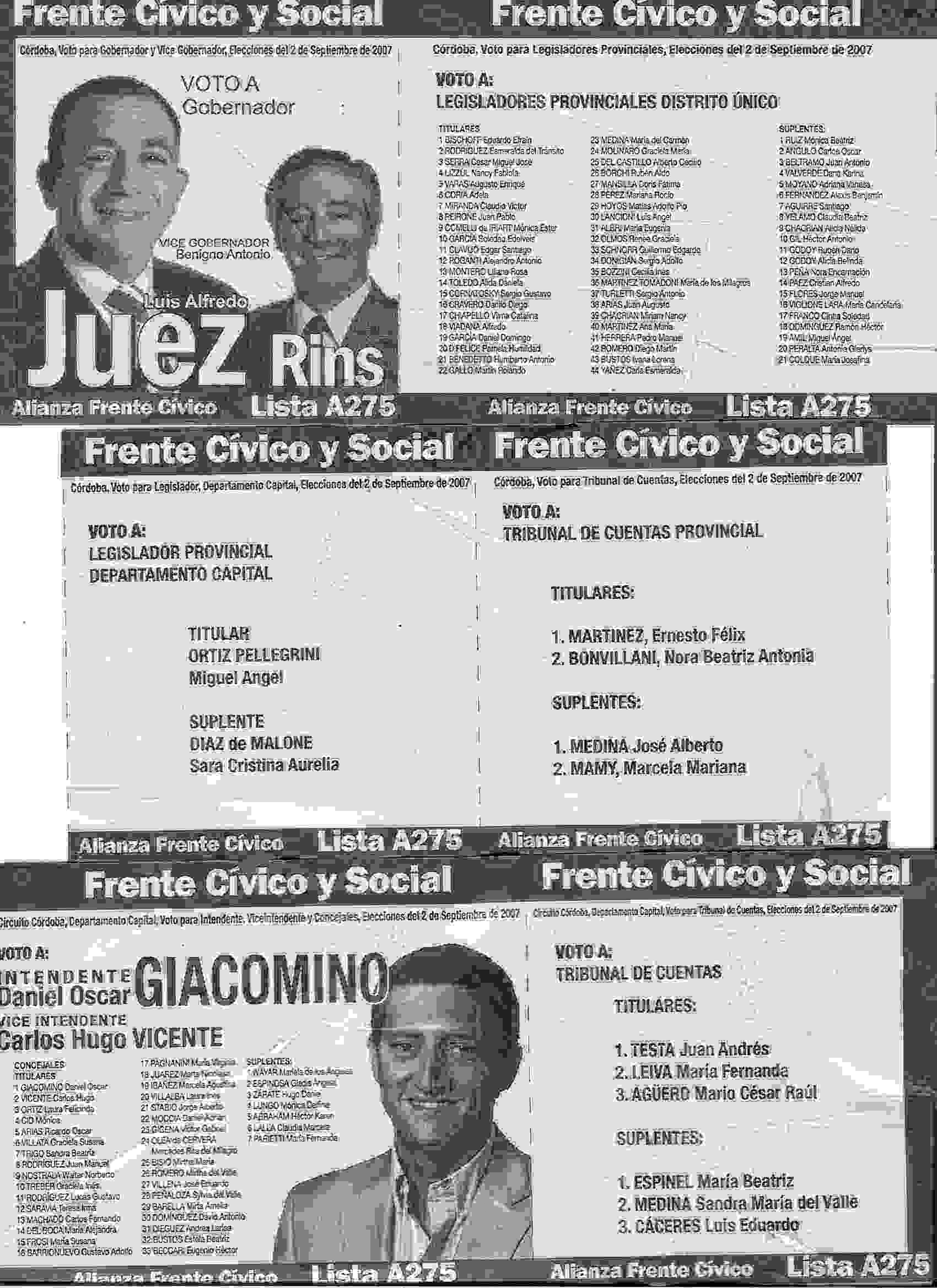
 Fat
Fat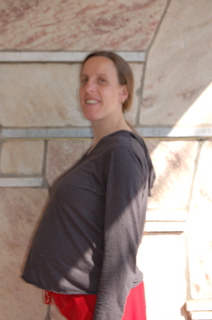 Fattest! Martin and Cami are very jealous because they have been working for years on their stomachs and I have come in from behind and overtaken them both from no-where!
Fattest! Martin and Cami are very jealous because they have been working for years on their stomachs and I have come in from behind and overtaken them both from no-where!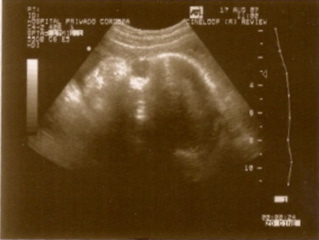 The cause of all the trouble. Blissfully unaware, at his seven month scan a couple of weeks ago. We saw him asleep with his foot in his mouth…. aaaah.
The cause of all the trouble. Blissfully unaware, at his seven month scan a couple of weeks ago. We saw him asleep with his foot in his mouth…. aaaah.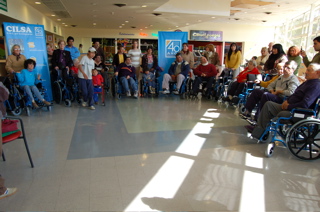 Back in June I posted a blog entry which mentioned a little boy in San Marcos village whose mother had spent several years trying unsuccessfully to extract a wheelchair from local social services. Through a contact of a friend of another contact of another friend (this is Argentina!), we managed to establish a link with the Córdoba branch of a national organisation, Cilsa, who are involved in various disability-based projects, including providing wheelchairs and other equipment. We then had to present a pile of paperwork, documents, measurements, and photos to prove that Isma is entitled to a wheelchair, and to determine the size that he needed. Last week we received a message to say that the chair was ready, and to invite Isma and his mum to come to a group presentation today.
Back in June I posted a blog entry which mentioned a little boy in San Marcos village whose mother had spent several years trying unsuccessfully to extract a wheelchair from local social services. Through a contact of a friend of another contact of another friend (this is Argentina!), we managed to establish a link with the Córdoba branch of a national organisation, Cilsa, who are involved in various disability-based projects, including providing wheelchairs and other equipment. We then had to present a pile of paperwork, documents, measurements, and photos to prove that Isma is entitled to a wheelchair, and to determine the size that he needed. Last week we received a message to say that the chair was ready, and to invite Isma and his mum to come to a group presentation today. 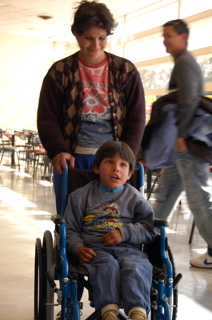 On Monday night I travelled out to San Marcos. Yesterday morning I visited the family and arranged the trip. Today we set off early to catch the bus to Cordoba. Funny the little things that one doesn’t think about… I hadn’t imagined that Isma has probably never been to a big city before. He loved the buses and lorries, and he laughed and laughed when we took him on the escalators in the bus station! Cilsa were giving out equipment to about twenty recipients and they had made a little event out of it, with celebratory cake and music. Our wheelchair was the smallest in the line. Isma seemed quite pleased with it, and I would estimate that it will take him all of about five minutes to figure out how to make it work. Having saved his mum’s back on one hand, we have probably given her a whole new set of things to think about, starting with child-proofing the house, and issuing shin-guards to the rest of the family.
On Monday night I travelled out to San Marcos. Yesterday morning I visited the family and arranged the trip. Today we set off early to catch the bus to Cordoba. Funny the little things that one doesn’t think about… I hadn’t imagined that Isma has probably never been to a big city before. He loved the buses and lorries, and he laughed and laughed when we took him on the escalators in the bus station! Cilsa were giving out equipment to about twenty recipients and they had made a little event out of it, with celebratory cake and music. Our wheelchair was the smallest in the line. Isma seemed quite pleased with it, and I would estimate that it will take him all of about five minutes to figure out how to make it work. Having saved his mum’s back on one hand, we have probably given her a whole new set of things to think about, starting with child-proofing the house, and issuing shin-guards to the rest of the family.